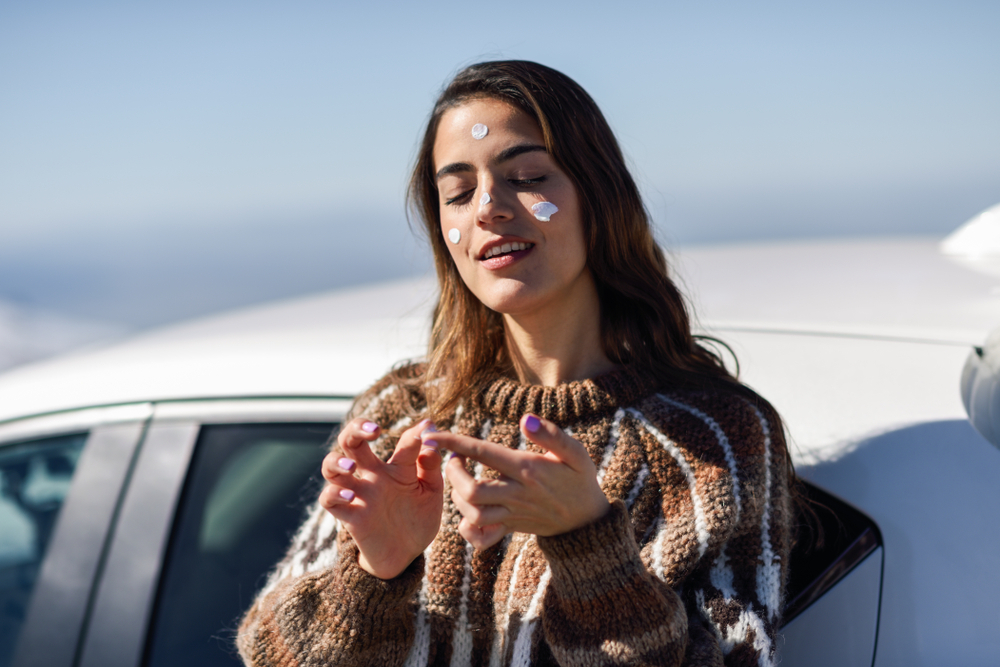For most people, applying sunscreen in the summer is second nature. Whether you're spending a day at the beach or enjoying a good book in the garden, you know to apply sunscreen before you go out to protect your skin from the harmful effects of ultraviolet (UV) rays.
But how important is applying sunscreen in winter, when sunshine seems like a distant memory and most of your body is buried beneath layers of clothing? Dermatologists and other experts agree that sunscreen is just as vital in the colder months. Sun protection is an integral part of a protective winter skin care regimen—especially for your face. Here's what you need to know about the benefits of wearing sunscreen in the winter.
What's the Truth about Seasonal Sunshine?
The Earth is tilted in space so that its Northern Hemisphere receives less direct sunlight for less time in the fall and winter months. While this does mean colder weather, shorter days, and weaker sun, it doesn't mean you're avoiding potentially harmful UV exposure.
What Are the Benefits of Wearing Sunscreen in the Winter?
The sun's rays are divided into two main types: UVA and UVB. Both types can wreak havoc on your skin, and their damage adds up over the years. UVA rays are responsible for the majority of premature photoaging in the skin. UVB rays are what burn your skin, causing pain, redness, and peeling in the short term and contributing to your skin cancer risk in the long term.
It may surprise you to know that UVA rays are present in the atmosphere year-round. With a longer wavelength, they can penetrate through clouds, glass, water, and even some clothing. If you don't protect your skin from UVA rays for long periods throughout your life, the cumulative effect can damage your skin cells' DNA, leading to fine lines, wrinkles, age spots, and even skin cancer.
Similarly, UVB rays aren't completely gone either. Though these rays are strongest in the summer—especially between the hours of 10 a.m. and 4 p.m.—this doesn't mean they're not present in the winter or that you can't get burned.
When Are You at Risk of Winter Sun Damage?
In short, you're at risk anytime you're exposed to these rays. Ice skating on your favorite pond, shoveling snow from your driveway on a sunny morning, or working inside by a window can all leave your skin at greater risk of sun damage.
Spending time in snow or on ice can increase that risk. The American Cancer Society advises that you should be especially careful in areas with snow. Snow reflects sunlight, increasing the amount of UV radiation that reaches your skin. In fact, snow reflects up to 80 percent of the sun's UV light, so these rays hit you twice. Furthermore, the sun can be stronger at high altitudes where there's less atmosphere between you and the sun to filter out harmful rays—another reason for added care if you're on the slopes.
Fitting Sunscreen into Your Skin Care Routine
No matter where you live or what season it is, the most effective way to prevent cumulative UV damage is by wearing a broad-spectrum sunscreen every day. EltaMD UV Daily Broad-Spectrum SPF 40 is a great choice. It blocks both harmful UVA and UVB rays while moisturizing and restoring your skin with Hyaluronic Acid and Vitamin E. In addition to your face, remember to apply sunscreen on other commonly exposed areas, like the tops of your ears, the backs of your hands, and your neck and upper chest.
Additionally, if you experience cracked or chapped lips in the winter, start using a product like EltaMD UV Lip Balm Broad-Spectrum SPF 36. This creamy premium lip balm protects your lips from the sun while soothing and moisturizing them.
Sunscreen is important every day of the year. Make it the last step in your daily skin care routine, after your usual serum and moisturizer, and apply it to your face, neck, chest, and hands. Wearing sunscreen in winter—even if you're not spending time outside—protects your skin from both types of UV damage and keeps your complexion healthy, vibrant, and youthful.
Remember: the sun's UV rays don't take the winter off, so neither should you!

